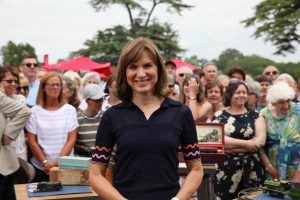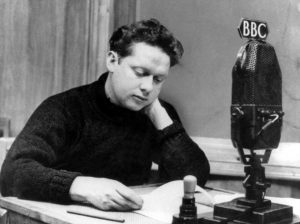Today on My Poetic Side, we look at a rare Antiques Roadshow find and a radio broadcast by Dylan Thomas.
How Much is a Poet’s Hair Worth?
 The answer to this question shocked a recent visitor to the Antiques Roadshow. A recent televised edition of the show was particularly moving for antiquarian book specialist Justin Croft who found himself looking at locks of hair belonging to not one but three of the romantic poets. The locks, which had been kept in scraps of folded paper, belonged to William Wordsworth, Samuel Taylor Coleridge and Robert Southey.
The answer to this question shocked a recent visitor to the Antiques Roadshow. A recent televised edition of the show was particularly moving for antiquarian book specialist Justin Croft who found himself looking at locks of hair belonging to not one but three of the romantic poets. The locks, which had been kept in scraps of folded paper, belonged to William Wordsworth, Samuel Taylor Coleridge and Robert Southey.
The value that was placed on the scraps of hair, which the owner had been keeping in a bottom drawer, was estimated to be between £30,000 to £40,000. Alongside the locks of hair, the owner also had a number of documents linked to both poets, including a portrait of Coleridge.
The guest who brought the items to the roadshow was able to confirm that the items had been handed down through several generations of his family. Locks of hair were often clipped as a keepsake when a couple needed to be parted and it is reasonable to assume that as the three poets, often referred to as the Lakes Poets, were friends that this is how they came to be together.
The folded paper labelled Coleridge contained some wiry black strands of hair from during the poet’s youth and a lock of white hair with a silk loop believed to have been taken when the poet was on his deathbed.
The valuation was something of a shock to the owner, who declared that he should probably find a better way of storing the locks of hair.
Poets Radio Masterpiece to be Brought Back to Life 70 Years on
 A radio broadcast that was made about the Llangollen International Musical Eisteddfod is to be recreated to mark the 70th anniversary of its creation.
A radio broadcast that was made about the Llangollen International Musical Eisteddfod is to be recreated to mark the 70th anniversary of its creation.
The original broadcast was made by the poet Dylan Thomas, and the recreation will feature a reading by Celyn Jones, the director, actor and writer. This recording will form the centrepiece of a small programme of events that will mark the anniversary of the literary genius’s visit to the Eisteddfod in 1953.
The original recording with the poet’s deep resonant voice conjured up some stunning images of the event, but it almost didn’t take place as Thomas lost his notes during his journey to the BBC studio in Cardiff.
The festival itself has been established only 6 years previously following the dark shadow cast by World War Two, and its purpose was to promote peace through dance and musical harmony. Since the first festival, thousands of competitors from all over the world have attended the annual celebration.
This year makes the first full-length festival to take place since the Covid-19 pandemic. The event will begin on 4thJuly and will run until 9th July.
Thomas died just a few months after his visit to the Eisteddfod however, his legacy lives on, and his connection to the festival is an important one.


You must register to comment. Log in or Register.